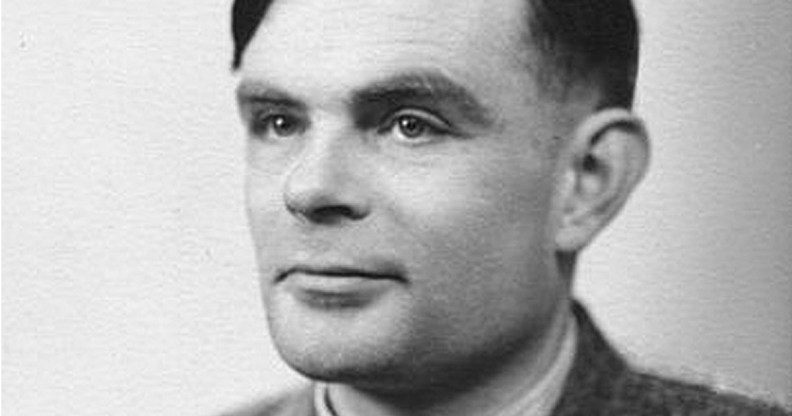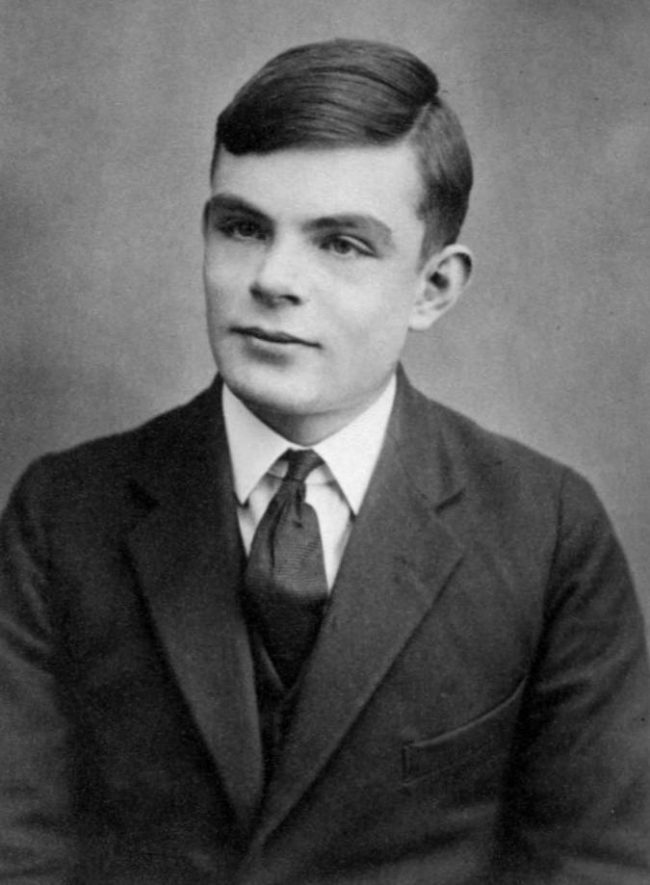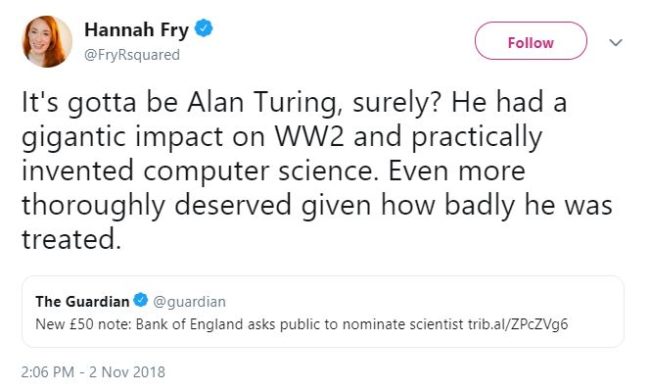Alan Turing could be the new face of the £50 note

(Creative Commons)
Gay codebreaker Alan Turing is one of the frontrunners to become the official face of the £50 note.
Bank of England Governor Mark Carney on Friday announced a public contest to find a figure from the world of science to replace inventor James Watt on the redesigned bank note.
Members of the public can make nominations online for the figure to appear on the note.
Computer scientist and codebreaker Alan Turing is among the frontrunners for the honour, alongside mathematician Ada Lovelace and physicist Stephen Hawking.
Turing, often hailed as the grandfather of modern computing, was convicted of ‘gross indecency’ in 1952 after having sex with a man, and was chemically castrated, barred from working for GCHQ, and driven to suicide.

Alan Turing (Creative Commons)
During World War II, the mathematical genius worked at Bletchley Park to crack the German Enigma codes, which is widely believed to have led to the war ending earlier than expected.
Once a historical pariah, Turing has become one of Britain’s most celebrated LGBT+ heroes.
Turing was granted a rare posthumous royal pardon by Queen Elizabeth in 2013 after a public campaign. The government later passed a law allowing men with historical gay sex convictions to apply for pardons and disregards.
The codebreaker has attracted strong support in the £50 note contest.

Alan Turing (Creative Commons)
Richy Thompson, Director of Public Affairs and Policy at Humanists UK, told PinkNews: “We’d be very happy to see Alan Turing placed on the £50 note.
“Turing was a humanist who helped save the UK during World War II and invented modern computer technology as we know it, but the UK still subjected him to harsh, homophobic treatment and attempted to ‘cure’ him of his sexuality through chemical castration.
“That terrible treatment can never be undone, but the new £50 note presents an opportunity for the UK to honour one of its greatest heroes.”
An editorial from London’s Evening Standard newspaper states: “Lovelace and Turing are two great Britons. It’s time we literally put our money where our mouths are and recognise at least one of them on our new banknote.”
It adds: “[Turing’s] work at Bletchley Park, which led to the cracking of the Nazi Enigma code, is widely regarded to have ended the Second World War early and saved millions of lives.
“Not only was he not recognised in his lifetime; he was convicted of homosexuality by the country he helped to rescue, chemically castrated and committed suicide.”
Mathematician Hannah Fry tweeted: “It’s gotta be Alan Turing, surely? He had a gigantic impact on WW2 and practically invented computer science. Even more thoroughly deserved given how badly he was treated.”

Tory MP Ben Wallace added: “I strongly believe that Alan Turing should feature on the new £50 note.”

The public can make their nominations for the £50 note online until December 14.
Four experts in the field of science, Dr Maggie Aderin-Pocock, Dr Emily Grossman, Professor Simon Schaffer and Dr Simon Singh, will join bank officials in drawing up a shortlist from the public nominations.
The governor will make the final decision, with the choice announced in 2019 alongside a concept design for the new note.
Carney said: “There is a wealth of individuals whose work has shaped how we think about the world and who continue to inspire people today.
“Our banknotes are an opportunity to celebrate the diversity of UK society and highlight the contributions of its greatest citizens.
“My colleagues and I look forward to hearing from the public as they think science and put forward their nominations.”
Gay fashion designer Alexander McQueen made it onto the shortlist for inclusion on the £20 note when a similar competition was held in 2015, but the honour ultimately went to artist J. M. W. Turner.
Jane Austen appears on the £10 note that entered circulation in 2018.

